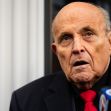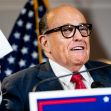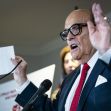The shaky foundation holding up ex-President Trump’s house of cards about election fraud got a bit closer to collapsing when his personal lawyer, Rudy Giuliani, was suspended from practicing law in New York State by the Appellate Division of the New York Supreme Court.
In a harshly worded 33-page decision on June 24, the court reviewed recommendations from its Attorney Grievance Committee (AGC) that asked for an order that the former New York City Mayor be suspended from practicing law for violating several sections of the state’s Rules of Professional Conduct.
Mincing no words, the court found “uncontroverted evidence” that Giuliani “communicated demonstrably false and misleading statements to courts, lawmakers and the public at large,” while he was representing Trump in his “failed effort at reelection in 2020.” The court went on to provide the reasons, which they called attempts to “improperly bolster” the narrative that “due to widespread voter fraud, victory in the 2020 United States presidential election was stolen from his client.
“We conclude that respondent’s conduct immediately threatens the public interest and warrants interim suspension from the practice of law, pending further proceedings before the Attorney Grievance Committee.”
The court went on to explain that interim relief is “a serious remedy” that is sometimes available under certain circumstances, while formal disciplinary proceedings continue. Protection of the public is the most critical of these circumstances and is the primary reason why violations of the Rules of Professional Conduct, such as those committed by Giuliani, are taken so seriously. Under the rules, the suspended attorney is allowed a post-suspension hearing.
Suspension from practicing law, which might threaten the livelihood of attorneys, requires a finding of “uncontroverted claims of misconduct.” “Knowingly making false statements…involving dishonestly, fraud, deceit or misrepresentation…” satisfies these criteria, and the appellate court found plenty of those, providing a detailed list and explanations about the false and misleading statements made in court as well as to the media. These were:
- Pennsylvania received more absentee ballots than were sent out;
- His clients were presenting a fraud claim about canvassing practices, when no such claim was made, even though he later denied it;
- Repeatedly claiming that as many as 30,000 “dead people,” including boxer Joe Frazier, voted in Philadelphia;
- Numerous statements about how Dominion Voting Systems machines altered vote tallies in Georgia;
- Allegations that up to 165,000 underage voters, 2,500 felons and 800 dead people cast illegal ballots in Georgia;
- Illegal ballots were being retrieved from suitcases hidden under a table and then counted;
- Thousands and perhaps millions (his numbers varied widely) of illegal “aliens” or immigrants voted in Arizona;
Public and court records; extensive audits of ballots, some of which were counted by hand; lack of any affidavits or proof by Giuliani; extensive reviews of birth and death records; and a thorough review of the videotapes that claimed votes were being added from suitcases, confirmed that all these statements were false and misleading.
Giuliani countered that the AGC’s conduct violated his First Amendment right of free speech and argued that he did not know his statements were false. He also said that his statements were made in reasonable reliance on information provided by experts, elected officials, personal observations, newspapers and other records. These contentions were flatly rejected. The court wrote, “speech by an attorney is subject to greater regulation than speech by others." Because attorneys are perceived to be “in positions of knowledge” the court has a “weighty responsibility” to protect the public. In addition, the court was not persuaded by Giuliani’s argument that he was unaware of the falsity of the statements. Unfortunately for him, the court concluded that he could not provide a “scintilla of evidence” to support his claims.
The court then returned to the standard by which Giuliani’s suspension from practicing law is permitted. It stressed that “Uncontroverted claims of misconduct alone will not provide a basis for interim suspension, unless there is a concomitant showing of an immediate threat to the public interest.” Several factors were considered, including whether the conduct is continuing or is “likely to result in a substantial sanction at the conclusion of the formal disciplinary hearing proceeding.”
The court found that all conditions for suspension were met. Giuliani is still making personal and media appearances, even though he has been aware of this proceeding. Clearly unimpressed with any of his justifications, it concluded the “AGC has made a showing of an immediate threat to the public, justifying respondent’s interim suspension. We find that there is evidence of continuing misconduct, the underlying offense is incredibly serious, and the uncontroverted misconduct in itself will likely result in substantial permanent sanctions at the conclusion of these disciplinary proceedings.”
Finally, the court delivered a somber analysis of the harm and danger of Giuliani’s behavior. “The seriousness of respondent’s uncontroverted misconduct cannot be overstated. This country is being torn apart by continued attacks on the legitimacy of the 2020 election and of our current president, Joseph R. Biden. The hallmark of our democracy is predicated on free and fair elections. False statements intended to foment a loss of confidence in our elections and resulting loss of confidence in government generally damage the proper functioning of a free society.” The AGC also linked Giuliani’s behavior to the events at the U.S. Capitol on January 6.
Rudolph Giuliani is now suspended from practicing law in New York until the conclusion of the AGC’s disciplinary matters and until the Court issues a final order. The house of cards is beginning to fall.






